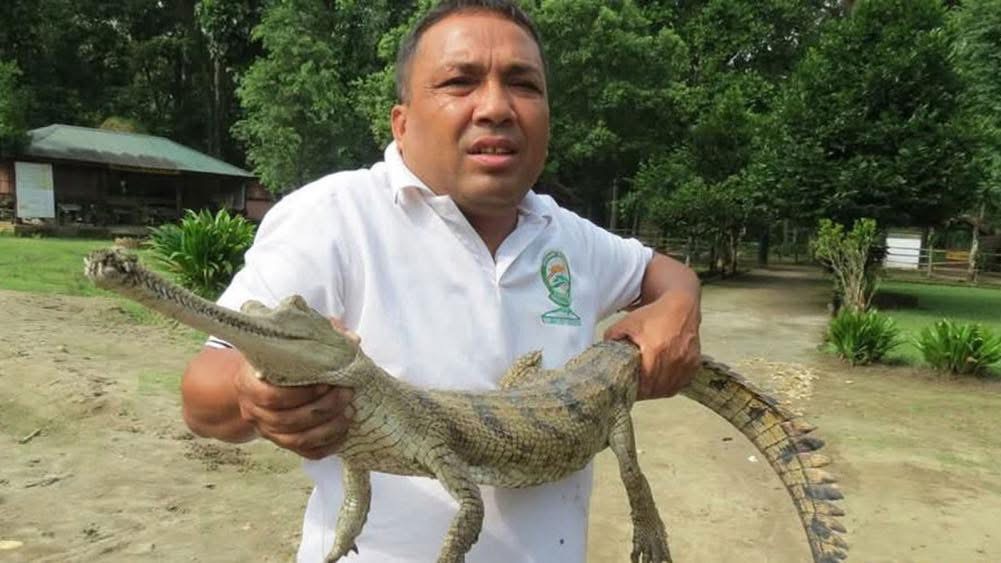Honoring a life spent protecting crocodiles, birds, and Nepal’s rivers
- Bed Khadka led the Gharial Breeding Centre in Chitwan for 18 years.
- He authored over 60 scientific articles and mentored dozens of conservationists.
- Our last memorable jungle journey together was in 2019 near the Rapti River.
- WWF and conservation leaders praised his lifelong dedication to Nepal’s biodiversity.
A Shared Journey in the Himalayas
I had the privilege of working alongside Bed jee during the Kanchenjunga Conservation Area Project (KCAP) between 1998 and 2000. Even then, his passion for the environment—especially birds and reptiles—was unmistakable. While most saw mountains and rivers as landscapes, Bed jee saw ecosystems filled with interdependent life. He was driven not just by science, but by deep empathy for all living things.

A Memorable Final Meeting in Chitwan
The last time I met Bed jee was in 2019 at his residence inside Chitwan National Park, where he had spent most of his professional life. It was a family trip from Lumbini—a reunion we had long talked about. He insisted we visit a tiger sighting spot near the Rapti River. While I was familiar with the area from past work, my kids were thrilled at the possibility of seeing a tiger.
It was a rainy day when we entered the park in our four-wheeler, with Bed jee himself guiding us through the jungle. Unfortunately, heavy rains turned the soil into deep mud, and our van got stuck in the middle of the forest. To our surprise, another tourist van carrying five passengers was also stranded nearby. We helped evacuate them first and returned to Bed jee’s government quarter in Kasara, where he graciously hosted us with warm, simple food.

A few hours later, our van was rescued, and we made our way back to Sauraha. That day didn’t deliver a tiger sighting—but it gifted us a lasting memory with a remarkable man whose hospitality and calm amidst the wild reflected his lifelong connection to the forest.
A Life Devoted to Crocodiles and Clean Rivers
Bed Khadka retired four and a half years ago as an Assistant Conservation Officer from Chitwan National Park, where he led the Gharial Breeding Centre in Kasara for 18 years. His focus on gharial crocodiles—those long-snouted, fish-eating reptiles unique to South Asia—made him a cornerstone of Nepal’s reptile conservation movement.

He mentored dozens of young conservationists, authored over 60 scientific papers (including 20+ on gharials), and represented Nepal in international conferences in India, Sri Lanka, South Africa, and beyond. His hands-on style—camping by rivers, patrolling at night, and manually recording nesting patterns—was legendary.
He viewed gharials not just as species to be saved but as symbols of river health and environmental purity. He tirelessly educated local communities about how clean rivers benefit both fish and humans—and how gharials, which never harm people, are vital indicators of a healthy ecosystem.
Impact That Still Flows
Thanks to Khadka’s efforts, Nepal now has 265 gharials in the wild—up from fewer than 50 in 1978. The Rapti River alone hosts 152 gharials today, while the Narayani supports another 113. These numbers tell a story of long-term dedication against the odds: habitat loss, water pollution, fishing net injuries, and declining prey.

According to The Kathmandu Post, conservationist Kamal Jung Kunwar, former Chief Conservation Officer of CNP, said:
His colleague Ashish Basyal, a researcher and co-author, recalled:
Basyal also credits Bed Khadka for continuing the vision of former chief Ramprit Yadav:
A Tribute from WWF Nepal
In a heartfelt message, Dr. Ghana Shyam Gurung, Country Representative of WWF Nepal, shared his grief:
A Conservation Legacy That Endures
Even after retirement, Khadka returned regularly to Kasara—mentoring newcomers, guiding field operations, and making sure every hatchling had the best chance at survival. His life, from recording crocodile eggs by hand to shaping international policy, has been one of quiet heroism.

He believed conservation isn’t just about saving species—it’s about educating people, protecting rivers, and preserving balance. In every way, Bed Bahadur Khadka was a gharial gothalo—a faithful herder of crocodiles and a gentle guardian of wild rivers.
Nepal has lost a rare soul, but his work continues to ripple through our forests, research papers, and memories. He may have left this world, but his vision will live on—in every bird call, every clean stream, and every newborn gharial sliding into the water.
🕊️🐊 Rest in peace, Bed Jee. You will never be forgotten.
— By Sunil Mani Dahal
For Virginia Times | Colleague & Friend
📸 All images above are sourced from Bed Khadka’s personal Facebook posts, used here with heartfelt respect to honor his legacy.
Freelance Writer













